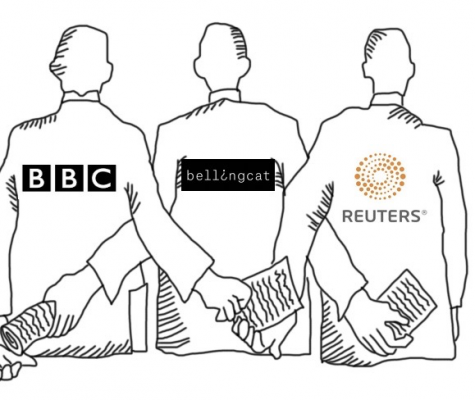Why don’t people trust the media?
March 25, 2021

It’s no secret that a large portion of the American population regards mass media with contempt. Whether it’s in YouTube comments or Twitter threads, you hear users left and right decrying the mainstream media, or “MSM” as they often call it. But why would they feel that way? After all, don’t they know that in a Western democracy like ours, the free and independent media is crucial to holding those in power accountable?
At least you’d hope so. In truth, the mass media generally play the opposite role: supporting those in power and manufacturing the public’s consent to their policies. The space in this article is too short for me to go into the long history of deception, subversion, propagandizing and warmongering that American and Western media more broadly have taken part in. Instead, we’ll look at one recent story that speaks volumes.
Today’s quaint little tale comes to us from one of our closest allies, the UK. On Feb. 20 2021, The Grayzone — an independent investigative outfit — published an article covering leaked documents that reveal that the UK Foreign & Commonwealth Office (FCO) has been secretly contracting with the BBC, Reuters and several other major outlets in an effort to “weaken Russia” and effect an “attitudinal change” among journalists, intellectuals and members of the public in Russia and adjacent countries.
The covert activities carried out jointly by the UK FCO and various press outlets are exactly the kind of activities the West has accused Russia of doing, except it seems that the initiatives carried out by the UK have actually been successful. One of the press outlets involved, Bellingcat, is noted in the Grayzone piece to have helped elect a NATO-friendly candidate in the 2019 North Macedonia presidential election; North Macedonia joined NATO in March 2020.
One of the most entertaining elements of this saga is the fact that Twitter introduced a new content label just for the Grayzone piece: “These materials may have been obtained through hacking.” Predictably, this caused the piece to spread even faster. One Twitter user said, “it’s nice of Twitter to include this feature which highlights journalism that is especially important.”
This is a truly scandalous story that demonstrates profound corruption at the core of Western institutions, but rest assured — you won’t see a word of it in American publications like the New York Times or Washington Post. Why would they scrutinize their UK counterparts? It is, in any case, a matter of public record that the Times itself has collaborated with the CIA beginning in the Cold War, as detailed by Watergate Reporter and Pulitzer Prize winner Carl Bernstein in a 1977 expose. The kind of corruption exposed in Britain is, no pun intended, old news in the US.
With this corruption in mind, it is my opinion that any worthwhile intellectual work over the next decade will not come from the press and think tanks, nor from the academies that feed them. Our only hope for independent inquiry is through new mediums that allow writers to bypass the compromised bureaucracy that keeps a tight leash on mainstream outfits like the BBC and Reuters in the UK and the New York Times, Washington Post and AP in the US.
One of these new mediums is Substack, a subscription-based service that hosts writers and delivers their pieces directly to your email inbox, completely free of advertising. If you can spare a few dollars to support independent journalism, I personally recommend subscribing to Glenn Greenwald, Matt Taibbi and Yasha Levine on Substack. The primary advantage of Substack and similar mediums is that they contravene the algorithmic filter bubbles enforced by Silicon valley platforms like Google and Facebook. There are many reasons to distrust and avoid those platforms, but that is a topic for another article.



